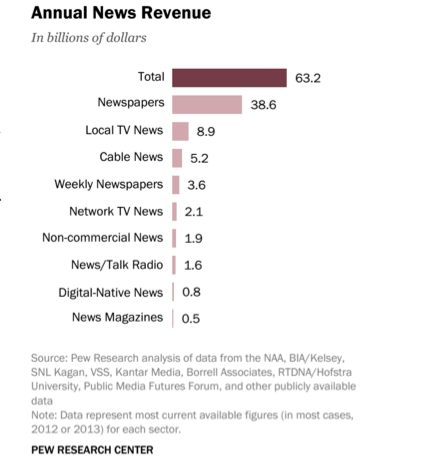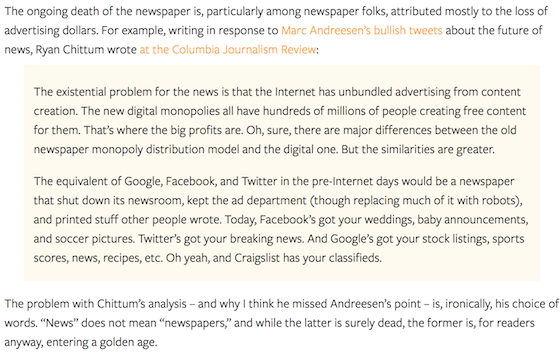Ben Thompson writes a three-part series about newspapers and the future of news over at his blog Stratechery.
Since the posts are basically a response to a piece I wrote criticizing Marc Andreessen’s assertion that the news business will grow exponentially over the next 20 years, and since I get to play the straw man in all three of Thompson’s posts, I thought I’d respond. The arguments read like something of a greatest hits of technology-centered tropes offered in the future-of-news debate, such as it’s been, for the last, oh, 10 years or so.
These include a gratuitous sneer at newspapers and those who value them (“Newspapers are held up as an irreplaceable tentpole of a free society, especially by the journalists who work at them”); the obvious presented as revealing (businesses are supposed to make money); hyperbole (“Newspapers Are Dead”); comparisons of apples and oranges (clicks on a blog post as the equivalent of subscribers to a paper); the apparently obligatory misrepresentations of other viewpoints (see below); trashing of core values (“ETHICAL WALL=VALUE WALL”); an uncritical faith in technology (“The Internet… is the impetus behind a new golden age”), and an equally unblinking techno-libertarian faith in markets, even for public goods such as news (“the market will, for the first time in the history of news, be the ultimate arbiter of what writers are worthwhile”). And here it’s all topped with a Randian vision of an army of journalist John Galts as the “few big winners” with the rest of the poor schlubs weeded out by the Darwinian forces unleashed by the internet:
What then, though, of the tens of thousands of journalists who formerly filled the middle of the bell curve? More broadly – and this is the central challenge to society presented by the Internet – what then of the millions of others in all the other industries touched by the Internet who are perfectly average and thus, in an age where the best is only a click away, are simply not needed?
This is the angst that fills those in the news business, and society broadly. The reality of the Internet is that there is no more bell curve; power laws dominate, and the challenge of our time is figuring out what to do with a population distribution that is fundamentally misaligned with Internet economics.
Yes, what do we do with this “population distribution”?
Let’s see if we get this straight: laid-off state house or investigative reporters are by definition mediocre while gainfully employed BuzzFeed aggregators are proof of the internet’s talent-sifting prowess? Got it.
This ugly thought is at the core of Silicon Valley’s Panglossian worldview, though it’s not usually put so crudely. Perhaps rather than bending journalism to the needs of technology, technology can be bent ever so slightly to accommodate the needs of public interest reporting. Just a thought.
What the technology-centered view can’t account for is the high cost of reporting, a labor-intensive activity. And because it can’t, it all but dispenses with it.
Alas, the greatest reporter in the world can’t unearth City Hall corruption while writing about the high school lacrosse match, live-blogging a city council meeting, much less hopping that bothersome ethical wall to sell ads or the like. Reported journalism doesn’t pay for itself, and this is the problem that even technology hasn’t yet solved.
Thompson’s vision of the future belonging to individual blogger/reporters is at this point wildly out of date, with the exceptions pretty much proving the rule.
Journalism, and I’m not especially happy about this either, needs institutions too. Audit Chief Dean Starkman, wrote about all this much better back in 2011. Here’s a sample:
In that spirit, I’m going to make a bold leap and predict–eenie meenie chili beanie–that for a long time the Future of News is going to look unnervingly like the Present of News: hobbled news organizations, limping along, supplemented by swarms of new media outlets doing their best. It’s not sexy, but that’s journalism for you.
I’ll go further and posit as axiomatic that journalism needs its own institutions for the simple reason that it reports on institutions much larger than itself. It was The New York Times and Gretchen Morgenson, followed quickly by Bloomberg’s late Mark Pittman, who first pried loose the truth about the bailout of American International Group: namely, that it was all about Wall Street, led by Goldman Sachs. Those tooth-and-nail battles were far from fair fights–Goldman’s stock-market capitalization is about fifty (that’s “five-oh”) times that of the Times’s parent. Whether it be called The New York Times or the Digital Beagle, we must have organizations with talent, traditions, culture, bureaucrats, geniuses, monomaniacs, lawyers, health plans, marketing divisions, and ad salespeople–and they must have the clout to take on the likes of Goldman Sachs, the White House, and local political bosses.
So, it’s best to take with a grain of salt what Thompson says we think:
Actually, the problem of the unbundling of advertising from content creation is a problem for all news media, with the few exceptions being places like Consumer Reports that rely on subscribers exclusively or almost exclusively, and that’s why I intentionally wrote “news” there and not “newspapers.”
I’m arguing that Google and Facebook are in fact the new middlemen, taking newspapers’ middleman role while not producing any news. When Thompson writes that the internet “has made life in the middle much more difficult, particularly for old-school advertising middlemen like newspapers,” he’s right, except he’s not accounting for those whopping exceptions like Google and Facebook, who combined take in half of all online advertising dollars, a far, far higher percentage of advertising dollars in a medium than any newspaper company did in print or TV company did over the airwaves before the Web. And their cost of content is effectively zero. That’s what I mean about the unbundling of advertising from content creation.
And it says something about the technology-centered argument—anyone suggesting the internet has created problems for journalism must be portrayed as a Luddite defending trade interests—that it needs to erect strawmen like this :
It is incredibly tiring to hear newspaper defenders talk as if advertising dollars are their god-given right, and that Google and Facebook are somehow stealing from them, when in reality Google and Facebook are winning in the fairest way possible: providing better value for the advertiser’s dollar.
Except I explicitly said the opposite:
This isn’t to say that this is a bad thing. Not at all. Craigslist, for instance, is a vast improvement over newspaper classifieds, where people used to get gouged for a tiny patch of text. A Google search is far better at finding information you know you want than flipping through a newspaper. Twitter is far timelier for breaking news than any print medium.
But hiving off those services has gravely (and probably irrevocably) damaged the news industry’s prospects.
Can we make a rule that if you’re going to link to something you should make a good faith effort not to pretend it says the opposite of what you say it says?
News has always depended on an advertising subsidy. Now advertisers can advertise at many other places that don’t produce news. The vastly increased supply drives down ad rates, making it difficult or impossible to sustain core reported journalism.
That’s why we’ve been hammering newspapers for years now about reader revenue. But even paywalls and memberships can only do so much. I suspect any long-term solution for public-interest reporting (and that’s what we’re talking about when we worry about the future of news) will entail a mix of reader revenue, ad revenue, and much heavier philanthropic or government (whoops! Did I say that?) support.
Happily the online news debate has progressed so much since Dean’s 2011 “Confidence Game” that even Thompson concludes that reader contributions will be necessary for the future of news.
By the way, those “dead” newspapers? They still have tens of millions of daily readers and pull in $39 billion a year, or about 48 times as much revenue as digital-news outlets combined.

Newspapers themselves pull in about four or five times as much revenue online as digital-only sites do.
They are still—a quarter century into the Web era—responsible for the vast majority of reported information and still employ eight to ten times the amount of journalists (Pew incorrectly includes Vice Media in that digital natives list I just linked, by the way).
Newspapers have critical problems that will in many cases be fatal, particularly for those that aren’t good enough to get significant revenue directly from readers. But let’s not put them in the grave just yet.
The question for them is the same it’s been for at least 15 years now: How can they transition to digital-only businesses models in the medium-to-long term? And if they can’t, how can we construct a reporting infrastructure to have the news we need that the market won’t provide?
It’s true as far as it goes that market-supported journalism will survive (though Andreessen is out to lunch when he says it will grow ten to 100 times over the next two decades). But much of journalism (believe it or not, neoliberals) is a public good—technically something that is not consumed no matter how many people use it but more broadly something society needs but the market may not support, an event known as a market failure
When technology-centered writers take on this problem the FON debate will be in much better shape. And no, Andreessen’s laughable assertion that the “total global expense budget of all investigative journalism is tiny–in the neighborhood of tens of millions of dollars annually” doesn’t count.
Ryan Chittum is a former Wall Street Journal reporter, and deputy editor of The Audit, CJR’s business section. If you see notable business journalism, give him a heads-up at rc2538@columbia.edu. Follow him on Twitter at @ryanchittum.

